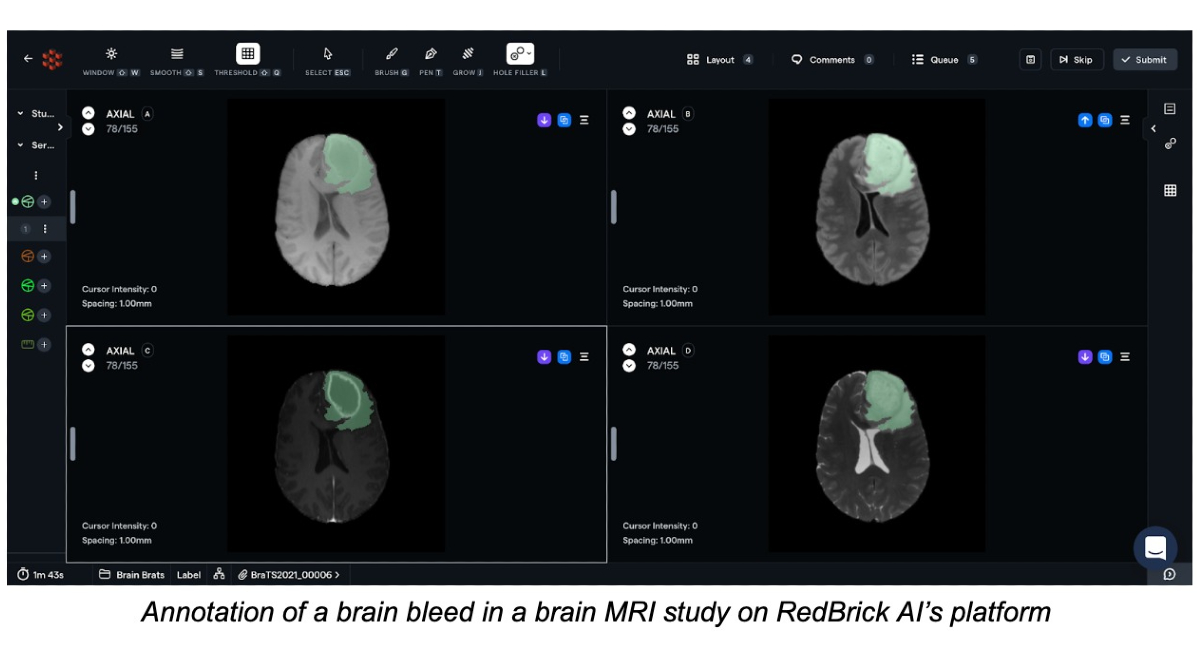Healthtech startup RedBrick AI has raised $4.6 million in a funding round led by Sequoia India and Southeast Asia’s Surge as it plans to expand the market for its medical imagery annotations solution.
Artificial intelligence has become ubiquitous in clinical diagnosis. But researchers need much of their initial time preparing data for training AI systems. The training process also requires hundreds of annotated medical images and thousands of hours of annotation by clinicians. The Delaware-headquartered SaaS startup, which has an Indian subsidiary in Pune, is solving that problem with its automated and semi-automated annotation tools.
RedBrick AI co-founder and CEO Shivam Sharma said the startup helps make annotations up to 60% faster using its configurable workflow system that works with medical imagery such as CT scans, X-rays, MRIs and ultrasound.
“We see ourselves building the foundational layer of artificial intelligence in healthcare. In the future, we want to help teams with everything from the data preparation to FDA clearance of the algorithms,” Sharma said in an interview with TechCrunch.
Founded in 2021 by former SpaceX Hyperloop engineers Sharma and Derek Lukacs (who serves as CTO), RedBrick AI offers specialized annotation tools that can be accessed through a web browser and integrated within customers’ existing data storage system, such as AWS, Google Cloud Platform and Azure. For annotating complex 3D medical images, it also has semi-automated tools.

Image Credits:
RedBrick AI additionally provides APIs that machine learning engineers can integrate with their cloud solutions and clinical data stores, including hospital enterprise PACS servers.
“Clinicians just need to log into their browser, and the workflow aspect of it is all automated,” Sharma said.
Once correctly annotated, imagery can be used for faster and more detailed diagnosis. The annotated imagery can also be used by surgical robots and to automate detection of cancers.
RedBrick AI has a seven-member team that is mostly based in India, though the startup focuses primarily on the U.S. and Europe for marketing its tools. The startup also sees 99% of competition coming from open-source tools, followed by the in-house ones developed by companies to address their specific requirements.
The early customer base of RedBrick AI includes Germany’s biotech startup Orbem, Canada’s cancer and disease screening platform Prenuvo, Boston-based non-profit hospital and physician network Mass General Brigham and Maharashtra’s radiology AI platform Deeptek.
The all-equity seed round also saw participation from Y Combinator and angel investors. Before this round, the startup was named among Y Combinator’s Winter 2022 cohort that was dominated by 32 Indian startups.
Sharma said RedBrick AI plans to utilize the fund to go beyond its current customer base and reach enterprises. It also plans to hire new engineers to expand the specialized toolset.
Sequoia India’s Surge backs healthtech startup RedBrick AI in $4.6M funding by Jagmeet Singh originally published on TechCrunch
from TechCrunch https://ift.tt/lG8koeN
via IFTTT
Comments
Post a Comment